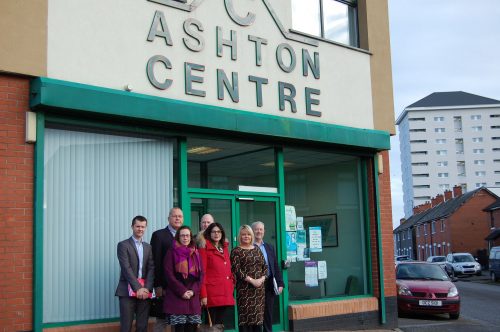
In February, Marc Vermyle and Rossella Chiodo, European Commission representatives with geographical responsibility for the NI ESF Programme, visited Ashton Community Trust to hear first-hand how projects are making a difference in improving the lives of people from disadvantaged communities.
Ashton Teams
Visiting the Ashton Centre, guests had an opportunity to meet the teams at FabLab, CORE and LEMIS+ Projects, as well as service users, to hear about the innovative ways in which the European Social Fund (ESF) is helping to improve the lives of people in North Belfast and beyond.
Heart of the Community
Speaking at the tour, Pat Boyle, Head of Training & Employment Services at Ashton said: “The success of Ashton is that we are embedded in the heart of the communities that we work in. We’re able to identify at the earliest stages how the City is developing and we adapt our service development and delivery to account for future employment and social inclusion requirements.”
Talking with the EC officers, a local North Belfast woman highlighted: “I’ve always worked, even when I was pregnant, and last year I was made redundant. I began to suffer from depression and didn’t think I could find a job but when I was referred to the LEMIS+ Project my life changed, even my doctor noticed a difference.”
Real Jobs
Further detailing the positive differences Ashton make, Pat Boyle commented: “We are truly getting people into real jobs and changing lives. We identified that for many people in disadvantaged communities the lack of qualifications is a barrier when applying for jobs. Our response was to establish training programmes which provide people with vocational pathways into employment opportunities. When our mentors identified that people didn’t have the computer skills to find and apply for jobs on-line, we established basic computer classes. In short, Ashton is continually adapting to best meet the needs and wants of people in North Belfast and aims to continue this much needed work for many years to come.”
